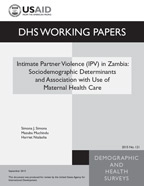
Abstract:
This study used the 2013-2014 Zambia
Demographic and Health Survey (ZDHS) dataset
to examine, on one hand, the sociodemographic
characteristics associated with intimate
partner violence (IPV) and, on the other
hand, the relationship between IPV and use of
maternal health care (place of delivery and
ANC visits). The study was based on 6,087
women, age 15-49, who were interviewed as
part of the domestic violence module of the
ZDHS. They reported having been in an
intimate relationship previously and giving
birth in the five years preceding the survey.
Data were analysed using STATA 13.
The study found that women’s characteristics,
including marital status, household wealth,
witnessing parental violence, and attitudes
justifying wife beating, were significantly
associated with reporting experience of IPV,
after adjusting for educational attainment,
occupation, alcohol
consumption, area of residence, and other
socio-economic factors. Partner
characteristics significantly associated with
IPV were alcohol consumption and controlling
behaviour.
IPV is only significantly associated with
maternal delivery in a health facility at the
bivariate level of analysis. It is not
significantly associated with use of maternal
health care after adjusting for area of
residence, mother’s age for the most recent
birth, birth order, educational attainment,
and wealth.
The study indicates that gender inequality
and problematic cultural norms that privilege
men with power over women still exist in
Zambia, and thus IPV preventive strategies
should incorporate a way to adjust such
cultural norms, not only to increase the use
of maternal health services but also to
enhance the welfare of women.
 Intimate Partner Violence (IPV) in Zambia: Sociodemgraphic Determinants and Association with Use of Maternal Health Care (PDF, 669K)
Intimate Partner Violence (IPV) in Zambia: Sociodemgraphic Determinants and Association with Use of Maternal Health Care (PDF, 669K)
